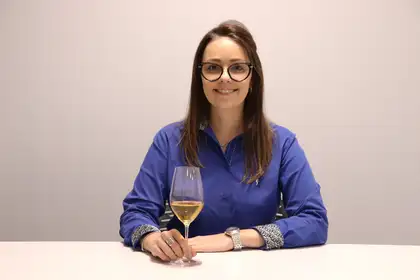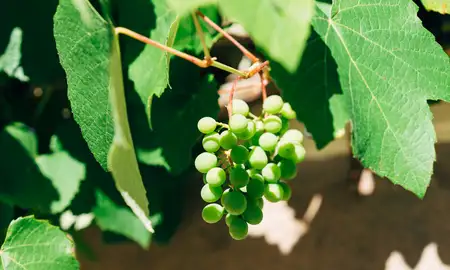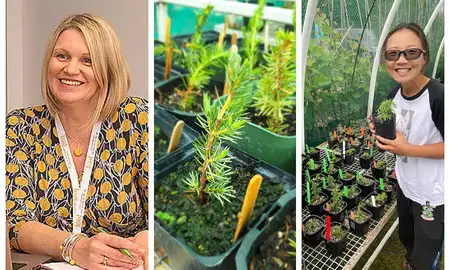
Dr Amanda Dupas de Matos.
Food Experience and Sensory Testing (Feast) Laboratory Senior Research Officer Dr Amanda Dupas de Matos has been awarded more than $100,000 from the Massey-Lincoln Agriculture Industry Fund (MLAIF) to explore the impact of thiols in white wines.
Her project, titled Realising the Potential of Thiols in White Wines: Sensory Consumer Responses and Chemical Characterisation, seeks to unlock valuable insights into the science behind consumer perceptions and the chemical dynamics of white wine production. This research could have significant implications for the Aotearoa New Zealand wine industry, which faces both economic and environmental challenges.
Thiols are a class of aroma compounds considered important determinants of acceptability given that some of these compounds provide key tropical fruit aromas to wine. While thiols are known for producing desirable tropical fruit aromas at certain levels, a high varietal thiol concentration can produce off-putting smells.
“While winemakers already employ various techniques, such as yeast selection and winemaking processes, to manipulate the presence of thiols, the specific concentration thresholds that consumers find most appealing remains unclear,” Dr Dupas de Matos says.
This gap in knowledge is what drives her research, which aims to pinpoint the optimal levels of thiols that enhance white wine’s sensory profile without deterring consumers.
The relevance of this project comes at a crucial time for New Zealand’s wine industry, which has seen its domestic sales dip to their lowest point in two decades (NZ Wine, 2024).
“In a competitive global market, understanding the factors that influence consumer preferences could help reinvigorate the industry. This research is also timely in the context of climate change, which poses new challenges for wine production,” she adds.
Dr Dupas de Matos’ project is a collaborative effort between Te Kunenga ki Pūrehuroa Massey University, Lincoln University and the Bragato Research Institute in Blenheim. Combining the sensory expertise of Massey’s Feast Laboratory with Lincoln University’s winemaking and chemical analysis capabilities, and Bragato’s expert wine panel, the project forms a cross-disciplinary team bringing together distinct areas of expertise.
“The outcomes of this research have the potential to impact the New Zealand wine industry. For winemakers, the ability to craft new white wine styles with more precise, consumer-tailored aromas could lead to enhanced market competitiveness and diversification. By better aligning wine production with consumer preferences, wineries will be able to mitigate market risks and increase profitability. The ability to produce wines with specific, sought-after characteristics could also help wineries tap into niche markets, commanding premium prices and improving overall market share," Dr Dupas de Matos says.
On a broader scale, this research will strengthen New Zealand’s reputation as an innovative and high-quality wine producer. As the global market for wine continues to evolve, staying ahead of trends and consumer demands is crucial for maintaining a competitive edge.
Dr Dupas de Matos says she is excited to begin this research project.
“I am very excited about this project. The idea was initiated back in November 2023 when I had the pleasure of meeting Professor Paul Kilmartin from the University of Auckland at the New Zealand Wine Centre Scientific Research Conference at the Marlborough Research Centre in Blenheim. He kindly connected me with Dr Leandro Dias Araujo from Lincoln, and soon after with Ngarita Warden from Bragato Research Institute. After plenty of discussions, we are excited to see this research come to life. Watch this space!”
Related news
Feast Laboratory: The virtual all-around tasting experience
With 80 per cent of new products failing in the marketplace, conducting consumer testing beforehand becomes imperative, highlighting the potential for virtual reality technologies to revolutionise predictions of consumer acceptance.

Pop the bottle: turning green into gold for Kiwi winemakers
Turning wine grapes destined to rot on the ground into value-added products is the focus of a new research project led by Dr Amanda Dupas de Matos, Consumer Sensory Researcher in the Food Experience and Sensory Tasting laboratory , aimed at helping winemakers reduce the amount of grapes going to waste.

Pivot Award for juniper berry research
The juniper berry - synonymous with gin - is the focus of Massey University research to evaluate and identify suitable strains and propagation methods with potential to give New Zealand-made gins a unique sensory signature.
